Your Cart is Empty

Steel wallets are a crucial part of any hodler’s backup setup.
But getting the right backup device is just as crucial. Bad backup devices really compromise your security and result in lost coins, which defeats the purpose of using them in the first place.
Long story short: Cryptotag’s design makes it unsuitable for long-term hodlers concerned about the safety of their funds. Cryptotags are too inflexible and make too many compromises to make them a truly recommendable seed backup device.

Many who are new to HODLing bitcoin are aware of the security that hardware wallets provide. Once they are confident their funds are secure, however, they may be missing a critical backup step to ensure the longevity of their mnemonic seed phrase.
Through the years, the horror stories of lost backups have become legendary and the marketplace responded with a wide variety of backup devices. The demand for fire and waterproof (as well as other natural or manmade forces) methods to store mnemonic seed phrases, private keys and other information was clear. This has been presented with several approaches, usually by committing this vital data into metal.
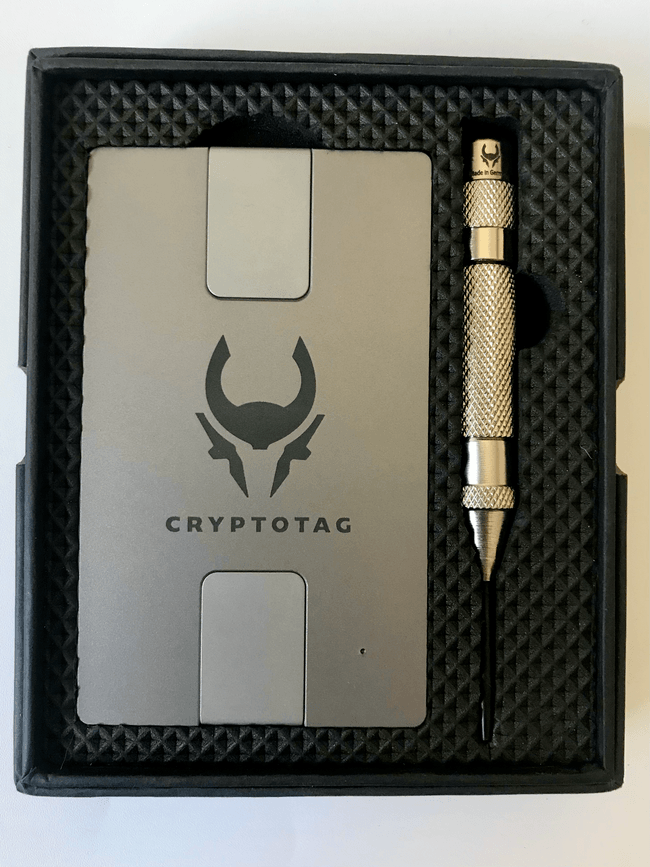
Cryptotag is a Dutch company which offers just one product line: the Cryptotag metal wallet.
This wallet backup device comes in two versions: Zeus and Thor. We’re reviewing the Zeus model today, as it’s the most popular of the two.
In this review, we’ll take a look at some of the most important considerations when buying a metal seed phrase backup device. We’ll cover how much it costs, how easy it is to use, any notable drawbacks, and how good the support is that’s available to users after their purchase.
The Cryptotag Zeus - the model under review here - retails for $129.00.
An expansion kit with room for 24 more seed phrase words will set you back another $119.00, almost as much as the initial purchase price.
The higher-end Cryptotag Zeus allows you to engrave two 24-word seed phrase - provided no words are longer than four characters - into the titanium plate. This works with the provided letter stamp tool, meaning your the actual words of your recovery phrase are engraved, not just a number corresponding to a word in a list, like the Zeus. This is the same functionality that other steel wallets such as Billfodl allow, however Cryptotag will charge you more than three times as much: $350.00.
The Cryptotag ships with FedEX Priority Mail, though you’ll have to pay for this if you’re only ordering one product (as most prospective buyers will be). Free shipping only kicks in with the purchase of two or more products.
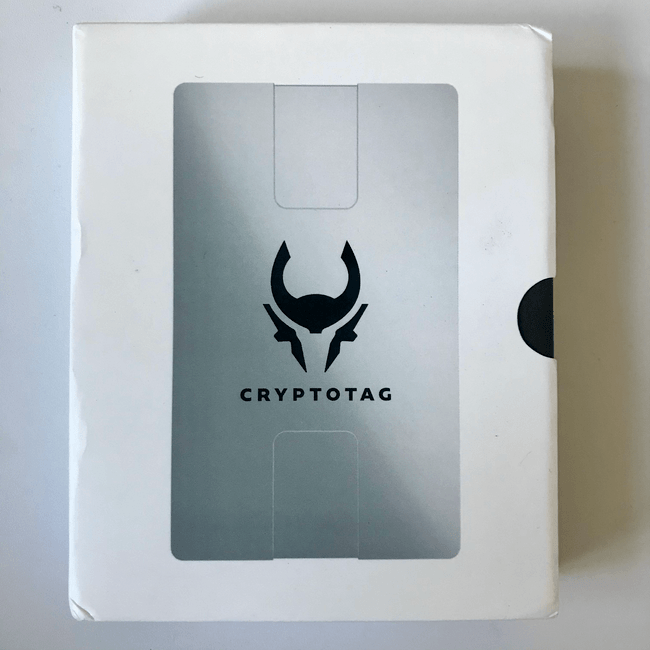
When you open the box, you’ll see the two Cryptotag plates clipped together, as well as the tool you’ll use to punch your seed phrase onto the plates.
Removing the plates from the box, you’ll find a set of earplugs and a box of matches hidden underneath. The matches are provided so you can burn your seed phrase after punching it into the metal. It’s a bit of a gimmicky touch, but who’s going to turn down an unexpected freebie?
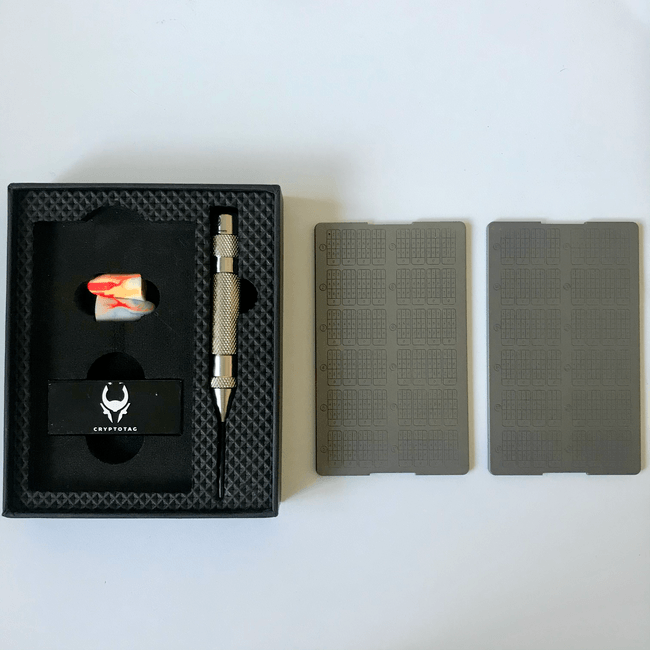
The Cryptotag is made from “space-grade” titanium, though Cryptotag doesn’t specify exactly which grade of metal this is or how it compares to the 316 Marine Grade Stainless Steel used in other wallets like the Billfodl. Additionally, all grades of titanium are used in aeronautical engineering, so it’s a bit of a misleading claim.
The Cryptotag plates measure 11.3 x 6.8cm (4.44 x 2.67 in). They are each 6mm (0.24 in) thick and together weigh 210g (7.4 oz).
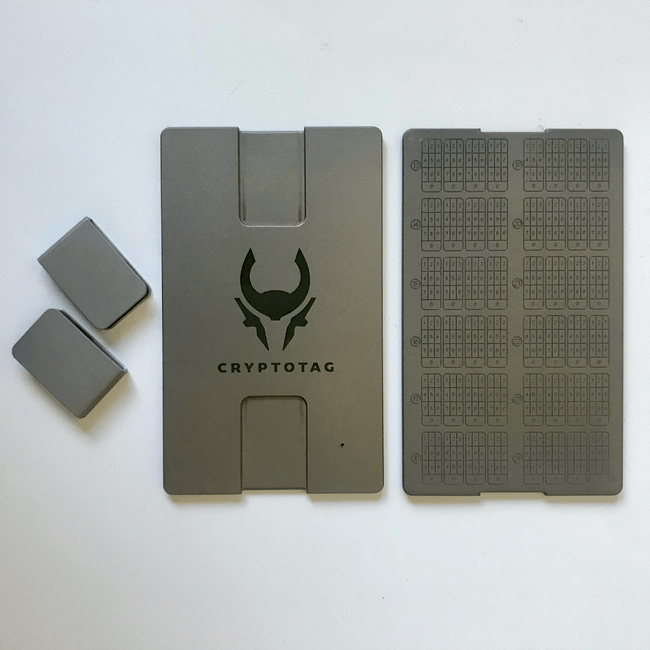
Overall, the Cryptotag feels solid. The brushed titanium is nice, though the clips that hold the two plates together are not as tight as they could be. There’s nothing fastening them in place, so if over time they loosen there’s the risk of your plates coming apart. It’s not much use to have 12 out of the full 24 words of a seed phrase.
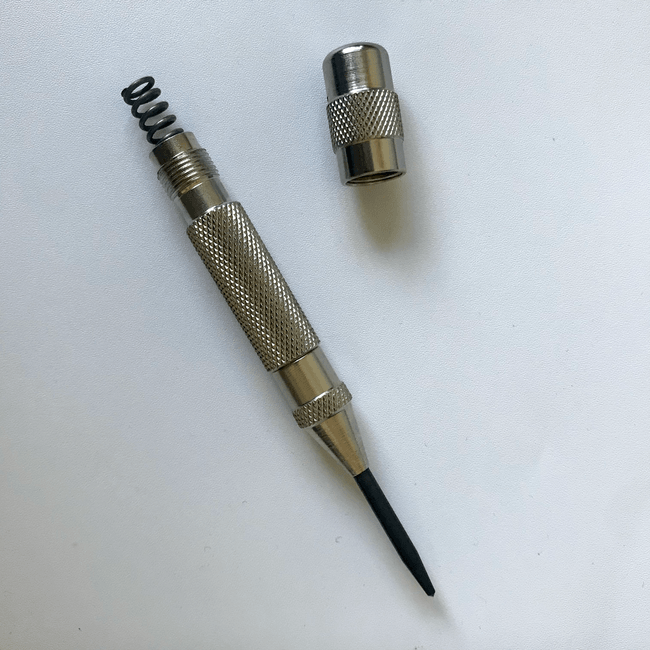
The tip of the punching tool has a large amount of travel to it. This spring-loaded mechanism means that the tip will absorb quite a way into the body when pressed.
It’s hard to see the use of this. It only makes it more difficult to accurately punch the already small numbers on the Cryptotag plates. You need to hit quite hard with a hammer (not provided) to make any indentation, and I found myself wondering how much easier this would be with a proper stamping tool with no travel.
You can unscrew the body of the punching tool. I’m not sure why you would want to, and it’s not clear why this is a feature either. It makes the tool seem less sturdy, as if it could fall apart at exactly the wrong moment.
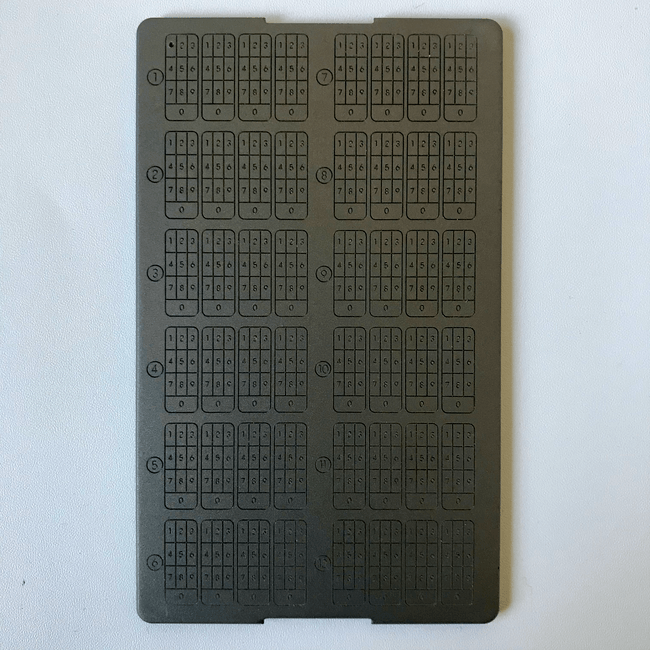
The Cryptotag Zeus is unique among metal wallet backups in that you don’t slot in letters to form your seed phrase. Instead, there are 24 engraved spaces, broken down into 10 divisions and numbered from 0-9.
To commit your seed phrase to the metal, you’ll need to look up each word in the provided booklet. This booklet contains a BIP39 word list. You find the four-digit number that corresponds to your seed words and then engrave this number into the metal plate.
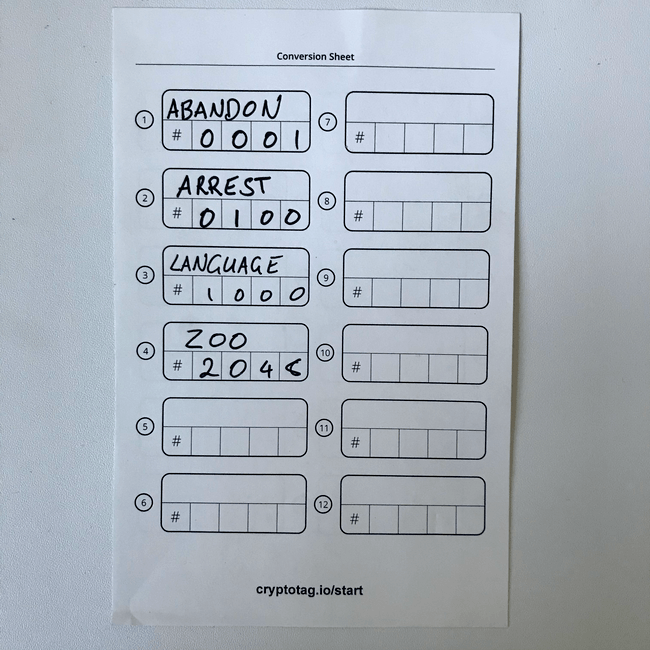
You might think that this introduces an additional layer of security, as your seed phrase is not directly engraved into the metal. But any thief who is smart enough to get their hands on your Bitcoin wallet backup is likely to know about the BIP39 word list. It also complicates the process of retrieving your seed phrase. This delay may prove crucial if you ever need to get control of your coins as quickly as possible.
You’ll need a hammer to punch the numbers accurately. Keep in mind that there’s no way to change or rearrange your seed phrase (as there is with a Billfodl) so once you make a mark, it’s there forever.
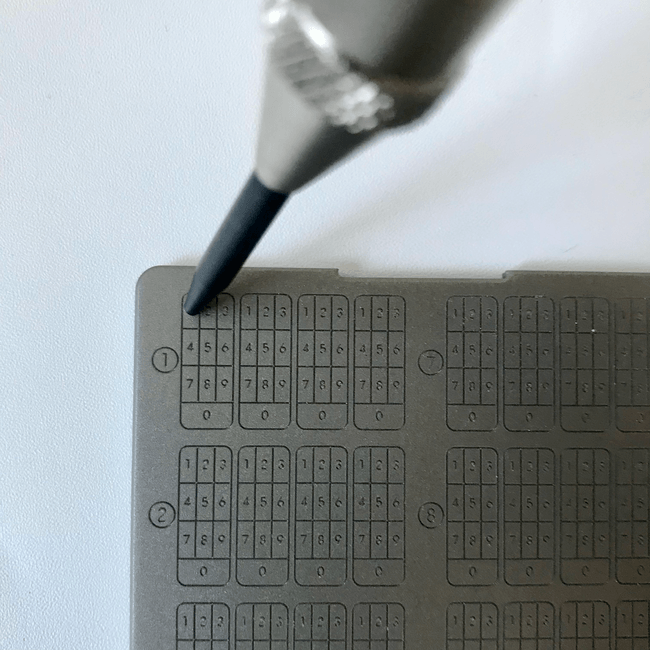
This also means that you can never remove your seed phrase from the metal plate. With a different type of steel wallet, you could simply remove the letters or jumble them.
But with the Cryptotag, you’d have to destroy the entire plate completely. This means that there’s no way to reuse a Cryptotag. You’ll also have to buy an expensive set of expansion plates if you want to change to using a new wallet with a different seed phrase.
This is a major limitation. You’ll have to completely empty any wallet if you’re no longer using the Cryptotag, as anyone who gets their hands on it will have full access to the funds in the wallet.
Since it relies on abstracting your seed phrase into numbers correlating to the words’ position on a list, the Cryptotag can only store BIP-39 mnemonic seed phrases and cannot back up private keys.
Cryptotag has a couple of videos on their website that explain the setup process. There’s also a short FAQ, but no visible way to get in contact if something goes wrong with your Cryptotag or if you have any questions.
This is not ideal. While a metal wallet backup may be intended to be a “set and forget” type of product, it’s always reassuring to have support available when you need it.
While the material of the Cryptotag may be sufficient to survive high temperatures and crushing forces, these advantages are quickly swept away because of other design flaws.
The fact that you can’t rearrange a seed phrase on the Cryptotag means that each metal plate is single-use only. It also means that you have to either empty out any wallets you’re no longer using the Cryptotag for, or treat each plate like a hot wallet forever.
The punching tool is also majorly flawed. It’s almost impossible to get a clean stamp on the metal plate, as the spring-loaded travel in the tool moves way too much for a single strike to be effective.
We give the Cryptotag Zeus a score of 5.2 out of 10.
Do yourself a favor and pick up a Billfodl instead. It is consistently our top pick for wallet backup products year after year!
The Cryptotag is made of titanium, which is less dense than the steel used in other physical wallets. The Cryptotag might suit a very specific niche, but its design flaws means it’s impossible to recommend to the average hodler looking to secure their crypto.
Billfodl is widely considered the gold standard for stainless steel wallet backups. That being said, the Cobo is cheaper. The Cryptotag is less safe than both the Billfodl and the Cobo Tablet, and more expensive. The Billfodl is safe, strong, and affordable.
